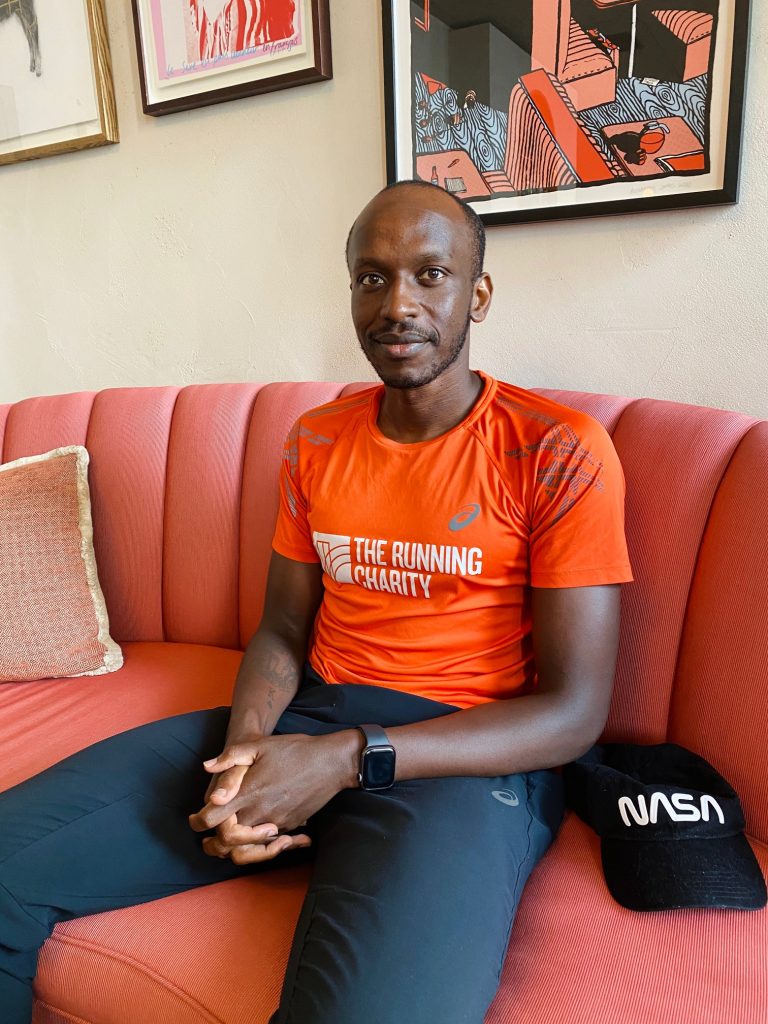
I was four years old when I witnessed the Hutus slaughtering my dad and my little brother and sister during the Genocide against the Tutsi. They used machetes. Me and mum were the only survivors. We were taken to a refugee camp but mum’s injuries were so bad they sent her to the UK for reconstructive surgery. They wouldn’t let her take me with her so I was sent to live with her sister in Tanzania. It was a typical African family, I didn’t know them at all and they were very disciplined, but my cousins were cool.
Mum applied for asylum and eventually arranged family reunion. I was ten when I came to the UK. I went to Fleet Primary in Gospel Oak, Hampstead. I only spoke Swahili and a bit of Arabic – I’d lost all my French and Kinyarwnada. I only knew how to say ‘Hello’ and ‘Manchester United’. I learned English with ESOL classes and by watching Eastenders.
It was World cup year and I begged and begged mum to buy me the England track suit, she gave in and I wore it non-stop. I was playing football on my own outside when some English kids said, “why you wearing that track suit – you’re not English”. I didn’t understand so I kept on playing. They grabbed me, beat me up and broke my nose. That was when I decided to get rid my ‘Africanness’, lose my accent – I made a conscious decision – I was eleven. I didn’t discuss it with mum, there’s a Rwandan saying, ‘Never talk about Money or Emotions’
My Camden secondary school was pretty rough with lots of gangs. I never joined a gang, I couldn’t see the point. I was angry that my father, brother and sister had been so brutally murdered, but I knew I didn’t want to use that violence against other people. I was a bit of a loner, I had friends but I didn’t have deep connections with anyone.
Mum really wanted me to go to Uni and I started at the University of Derby, but after the first year, I knew it wasn’t what I wanted. When I came home, mum had downsized and we were on top of each other and constantly arguing, so I just left. I went to the Council, but they said they wouldn’t help – I was a young healthy male – so no priority. They gave me a leaflet to New Horizon Youth Centre.
I sofa surfed for a week, but you lose your friends sofa surfing – they want to help you, but it’s difficult – no one has the space. I’d lost my passport and I was still a refugee and I was homeless. I spent the nights on the Bendy busses. There was one from Euston to Enfield, you could get on the back without paying, then get another one back into the City. I couldn’t really sleep for more than ten minutes, it was too frightened. I could use the Youth Centre during the day, then back on the streets – it was exhausting. After three months of this, the centre made a referral to Shelter from the Storm.
Without the safety net of the shelter, I wouldn’t be where I am today. I knew I had somewhere safe to stay at night with a hot dinner and that relieved me of my anxiety during the day. Without the security of the shelter, my mental health would have deteriorated. The shelter helped me get a job a Pret a Manger. I was there six months and work gave me a sense of normalcy – gave me a clear map of what I wanted to do. Living for free at the shelter also meant I could save up for a deposit. I had the opportunity to apply for an apprenticeship at the Cabinet Office and I grasped it and was successful. I moved in to my own place just before I started. I lasted nine months, but sadly no job at the end of it.
I was already a volunteer for The Running Charity and in 2015 they offered me a job as a coach and now I’m the Senior Programme Coach for London and Brighton. I feel valued, I feel safe and I have great, supportive community of co-workers. My relationship with mum is better now, I worked my way through homelessness to where I am now and I’ve gained her respect.
With my work, I try to build a foundation to help people build their own house – I guess that’s what Shelter from the Storm did for me.
